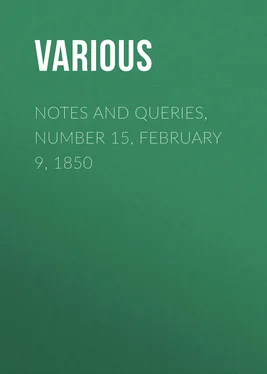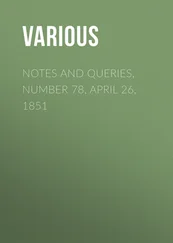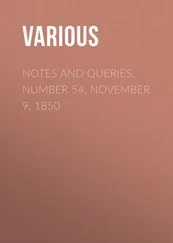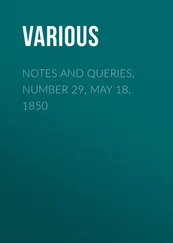Various - Notes and Queries, Number 15, February 9, 1850
Здесь есть возможность читать онлайн «Various - Notes and Queries, Number 15, February 9, 1850» — ознакомительный отрывок электронной книги совершенно бесплатно, а после прочтения отрывка купить полную версию. В некоторых случаях можно слушать аудио, скачать через торрент в формате fb2 и присутствует краткое содержание. Жанр: foreign_antique, periodic, foreign_edu, на английском языке. Описание произведения, (предисловие) а так же отзывы посетителей доступны на портале библиотеки ЛибКат.
- Название:Notes and Queries, Number 15, February 9, 1850
- Автор:
- Жанр:
- Год:неизвестен
- ISBN:нет данных
- Рейтинг книги:3 / 5. Голосов: 1
-
Избранное:Добавить в избранное
- Отзывы:
-
Ваша оценка:
- 60
- 1
- 2
- 3
- 4
- 5
Notes and Queries, Number 15, February 9, 1850: краткое содержание, описание и аннотация
Предлагаем к чтению аннотацию, описание, краткое содержание или предисловие (зависит от того, что написал сам автор книги «Notes and Queries, Number 15, February 9, 1850»). Если вы не нашли необходимую информацию о книге — напишите в комментариях, мы постараемся отыскать её.
Notes and Queries, Number 15, February 9, 1850 — читать онлайн ознакомительный отрывок
Ниже представлен текст книги, разбитый по страницам. Система сохранения места последней прочитанной страницы, позволяет с удобством читать онлайн бесплатно книгу «Notes and Queries, Number 15, February 9, 1850», без необходимости каждый раз заново искать на чём Вы остановились. Поставьте закладку, и сможете в любой момент перейти на страницу, на которой закончили чтение.
Интервал:
Закладка:
St. John’s Wood, Jan. 26. 1850.
NOTES FROM FLY-LEAVES, NO. 6
In a copy of Burnet’s Telluris Theoria Sacra (in Latin), containing only the two first books (1 vol. 4to., Lond. 1689), there is the following entry in Bishop Jebb’s hand-writing:—
“From the internal evidence, not only of additional matter in the margin of this copy, but of frequent erasures and substitutions, I was led to suppose it was the author’s copy, illustrated by his own annotations and improvements. The supposition is, perhaps, sufficiently corroborated by the following extract from the Biographia Britannica , vol. iii. p. 18.
“‘It seems it was usual with Dr. Burnet, before he published any thing in Latin, to have two or three copies, and no more, printed off, which he kept by him for some time, in order to revise at leisure what he had written currente calamo , and sometimes, when he thought proper, to be communicated to his particular friends for their opinions, &c.’
“This copy, as it does not differ from any of the editions of 1689, was certainly not one of those proofs . But the Doctor’s habit of annotating on his own Latin books after they were printed, renders it extremely probable that this book was a preparation for a new edition. It would be well to compare it with the English translation.”
The nature of many of the corrections and additions (which are very numerous), evidently shows a preparation for the press. I have compared this copy with the English edition, published in the same year, and find that some of the corrections were adopted; this, however, but in a few instances, while in one, to be mentioned presently, a palpable mistake, corrected in the MS. Latin notes, stands in the translation. The English version differs very materially from the Latin. The author says in his Preface:—
“This English version is the same in substance with the Latin, though I confess, ’tis not so properly a translation, as a new composition upon the same ground, there being several additional chapters in it, and several new moulded.”
The following are examples of corrections being adopted: P. 6. Latin ed. “Quod abunde probabitur in principio libri secundi.” For the last word subsequentis is substituted, and the English has following . P. 35. “Hippolitus” is added to the authorities in the MS.; and in the English, p. 36., “Anastasius Sinaiti, S. Gaudentius, Q. Julius Hilarius, Isidorus Hispalensis, and Cassiodorus,” are inserted after Lactantius, in both. P. 37. “Johannes Damascenus” is added after St. Augustin in both. P. 180. a clause is added which seems to have suggested the sentence beginning, “Thus we have discharged our promise,” &c. But, on the other hand, in p. 8. the allusion to the “Orphics,” which is struck out in the Latin, is retained in the English; and in the latter there is no notice taken of “Empedocles,” which is inserted in the margin of the Latin. In p. 11. “Ratio naturalis” is personified, and governs the verb vidit , which is repeated several times. This is changed by the corrector into vidimus; but in the English passage, though varying much from the Latin, the personification is retained. In p. 58., “Dion Cassius” is corrected to “Xiphilinus;” but the mistake is preserved in the English version.
JOHN JEBB.SHAKSPEARE’S EMPLOYMENT OF MONOSYLLABLES
I offer the following flim-flam to the examination of your readers, all of whom are, I presume, more or less, readers of Shakspeare, and far better qualified than I am to “anatomize” his writings, and “see what bred about his heart.”
I start with the proposition that the language of passion is almost invariably broken and abrupt, and the deduction that I wish to draw from this proposition, and the passages that I am about to quote is, that— Shakspeare on more than one occasion advisedly used monosyllables, and monosyllables only, when he wished to express violent and overwhelming mental emotion , ex. gratiâ:—
Lear. “Thou know’st the first time that we smell the air,
We wawl, and cry:—I will preach to thee; mark me.
[ Gloster. “Alack! alack the day!]
Lear. “When we are born, we cry, that we are come
To this great stage of fools,—This a good block?”
In this passage [I bracket Gloster] we find no fewer than forty-two monosyllables following each other consecutively. Again,
“– but through his lips do throng
Weak words, so thick come, in his poor heart’s aid,
That no man could distinguish what he said.”
After I had kept this among other flim-flams for more than a year in my note-book, I submitted it in a letter to the examination of a friend; his answer was as follows:—“Your canon is ingenious, especially in the line taken from the sonnet. I doubt it however, much, and rather believe that sound is often sympathetically, and as it were unconsciously, adapted to sense. Moreover, monosyllables are redundant in our tongue, as you will see in the scene you quote. In King John , Act III. Sc. 3., where the King is pausing in his wish to incense Hubert to Arthur’s murder, he says:—
‘Good friend, though hast no cause to say so yet:
But thou shall have; and creep time ne’er so slow,
Yet it shall come, for me to do thee good.
I had a thing to say,—But let it go:’—
forty monosyllables.”
“Credimus? an qui amant ipsi sibi somnia fingunt.”
The very passage he quoted seemed, to my eyes, rather a corroboration of the theory, than an argument against it ! I might, I think, have quoted the remainder of Lear’s speech ending with the words “Kill, kill, kill, kill, kill, kill,” and, with the exception of three words, consisting entirely of monosyllables, and one or two other passages. But I have written enough to express my meaning.
Читать дальшеИнтервал:
Закладка:
Похожие книги на «Notes and Queries, Number 15, February 9, 1850»
Представляем Вашему вниманию похожие книги на «Notes and Queries, Number 15, February 9, 1850» списком для выбора. Мы отобрали схожую по названию и смыслу литературу в надежде предоставить читателям больше вариантов отыскать новые, интересные, ещё непрочитанные произведения.
Обсуждение, отзывы о книге «Notes and Queries, Number 15, February 9, 1850» и просто собственные мнения читателей. Оставьте ваши комментарии, напишите, что Вы думаете о произведении, его смысле или главных героях. Укажите что конкретно понравилось, а что нет, и почему Вы так считаете.












